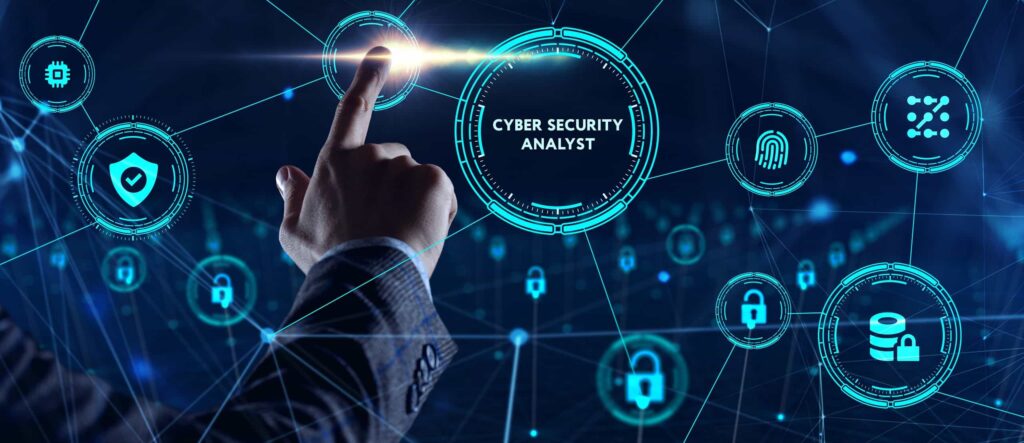Cybersecurity Analyst
Become a skilled cybersecurity analyst and protect organizations from evolving threats.
As a cybersecurity analyst, you will be at the forefront of defending organizations from cyber threats. This course offers a comprehensive foundation in security analysis, incident detection, and response. Through hands-on training and real-world applications, you’ll acquire the necessary skills to identify vulnerabilities, analyze risks, and protect sensitive data from attacks.
What is Cybersecurity Analyst ?
A Cybersecurity Analyst is a professional responsible for protecting an organization’s systems, networks, and sensitive data from cyber threats. They play a critical role in monitoring, detecting, and responding to potential security incidents while ensuring that robust measures are in place to prevent breaches.
Cybersecurity Analysts analyze system vulnerabilities, investigate security alerts, and implement solutions to mitigate risks. Their responsibilities often include:
- Monitoring Security Systems: Continuously overseeing networks and systems for unusual activities or unauthorized access.
- Threat Analysis: Identifying potential threats, analyzing patterns, and assessing risks.
- Incident Response: Responding to and managing security breaches, including containment and recovery efforts.
- Vulnerability Management: Regularly assessing systems for weaknesses and applying patches or upgrades.
- Reporting: Preparing reports on security metrics, incidents, and recommendations for leadership.
To succeed, Cybersecurity Analysts must have a strong understanding of network architecture, security tools (e.g., firewalls, SIEM systems, antivirus software), and threat detection techniques. They often hold certifications such as CompTIA Security+, Certified Information Systems Security Professional (CISSP), or Certified Ethical Hacker (CEH).
This role is crucial for safeguarding organizations against increasing cyber threats, ensuring data protection, and maintaining trust with stakeholders. With the growing demand for cybersecurity expertise, Cybersecurity Analysts are in high demand across industries.
What the Course Offers ?
Understanding Cybersecurity Threats
“Learn about various cybersecurity threats such as malware, ransomware, phishing, DDoS attacks, and insider threats.”Security Operations and Monitoring
“Gain insights into security operations, how to monitor systems for signs of malicious activity, and the tools used for effective monitoring.”Incident Response and Handling
“Master the processes involved in responding to security incidents, including detection, analysis, containment, and recovery.”Vulnerability Management
“Learn how to conduct vulnerability assessments and manage risks by patching or mitigating identified weaknesses.”Network and System Security
“Understand how to secure networks and systems by implementing firewalls, intrusion detection systems (IDS), and network monitoring solutions.”Security Information and Event Management (SIEM)
“Gain hands-on experience with SIEM tools that help collect, analyze, and respond to security data in real-time.”Compliance and Governance
“Understand security standards and frameworks such as GDPR, HIPAA, NIST, and ISO 27001, and learn how to implement them in an organization’s cybersecurity strategy.”

Our Approach
Our course delivers three key components
Understanding Threats and Vulnerabilities
- What You’ll Learn:
“Explore different types of cyber threats and vulnerabilities that organizations face, including malware, phishing, and network-based attacks.” - Why It’s Important:
“Identifying threats and understanding their impact on the system is the first step in designing effective defense mechanisms.”
Security Operations and Real-Time Monitoring
- What You’ll Learn:
“Learn how to monitor network traffic, system logs, and security alerts in real-time to detect potential attacks using SIEM tools.” - Why It’s Important:
“Continuous monitoring is essential for early detection of threats and minimizing damage from cyber incidents.”
Incident Response and Mitigation
- What You’ll Learn:
“Understand how to contain and mitigate the impact of security incidents, including breach investigation, analysis, and recovery steps.” - Why It’s Important:
“Being able to respond quickly and effectively can significantly reduce the damage caused by a cyberattack and prevent future breaches.”
Benefits of This Course
Expert-Led Training
Receive guidance from industry professionals who provide in-depth knowledge of real-world cybersecurity analysis.
Hands-On Experience
Work with tools and techniques that are used in actual cybersecurity operations, including SIEM software and vulnerability scanning tools.
Practical Incident Response Skills
Learn how to detect and respond to incidents effectively, reducing the risk and impact of security breaches.
Industry-Recognized Certifications
Prepare for certifications such as CompTIA Security+, Certified Information Systems Security Professional (CISSP), and Certified Ethical Hacker (CEH), which are highly valued by employers.
Job-Ready Skills
Learn the skills employers seek in cybersecurity analysts, including risk assessment, threat analysis, and incident management.
Real-World Scenarios
Participate in real-world simulations and case studies that mimic actual cybersecurity attacks and defense strategies.
Career Growth Opportunities
Enhance your career prospects with a deep understanding of cybersecurity threats, risk management, and defense strategies.
Conclusion
Cybersecurity analysts play a pivotal role in safeguarding organizations from the increasing number of cyber threats. This course will provide you with the skills and knowledge necessary to become a proficient cybersecurity analyst. From threat detection to incident response, you’ll be equipped to handle the complex challenges that come with protecting sensitive data and systems. Enroll now to start your journey toward a successful cybersecurity career!